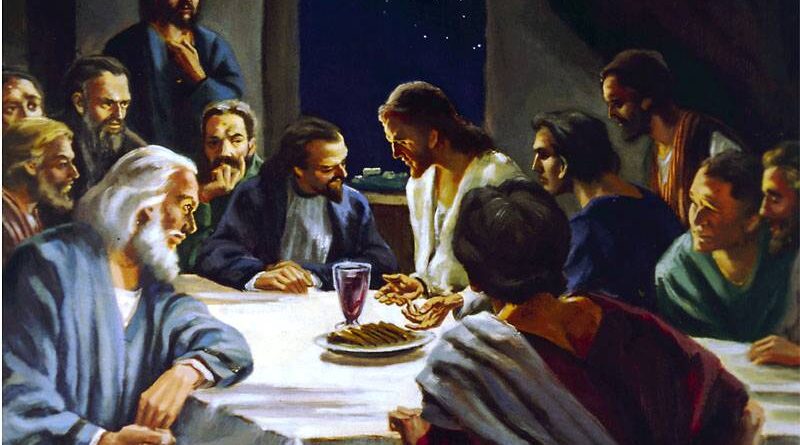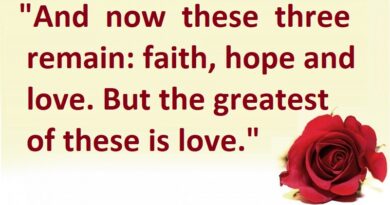Another Consideration About the Lord’s Supper
At 1 Corinthians 11:23-26 Paul, referring to the last meal that Jesus shared with his disciples, wrote,
“For I received from the Lord what I also delivered to you, that the Lord Jesus on the night when he was betrayed took bread, and when he had given thanks, he broke it, and said, ‘This is my body which is for you. Do this in remembrance of me.’ In the same way also the cup, after supper, saying, ‘This cup is the new covenant in my blood. Do this, as often as you drink it, in remembrance of me.’ For as often as you eat this bread and drink this cup, you proclaim the Lord’s death until he comes.”

Was Jesus merely instituting a ritual as is commonly practiced in many churches today? Or should we look to see if there might be some greater meaning to this event?
Concerning Jewish rituals Paul wrote,
“Therefore let no one pass judgment on you in questions of food and drink or with regard to a festival [this would include Passover] or a new moon or sabbaths. These are only a shadow of what is to come; but the reality is Christ’s.”
Though based on historical incidents in Israel’s past, Paul shows that the Jewish ceremonies foreshadowed the reality that we have in Christ. Being the anti-type of the Passover lamb, Jesus was the fulfillment of the Jewish Passover. Could it be that the Lord’s Supper, though having a historical basis, likewise has a greater significance? — Colossians 2:16, 17; 1 Corinthians 5:7; consider also Hebrews 8:5
John 6:35, 40, 51, 53-56 records Jesus as saying,
“I am the bread of life; he who comes to me shall not hunger, and he who believes in me shall never thirst…. For this is the will of my Father, that every one who sees the Son and believes in him should have eternal life; and I will raise him up at the last day…. I am the living bread which came down from heaven; if any one eats of this bread, he will live for ever; and the bread which I shall give for the life of the world is my flesh…. Truly, truly, I say to you, unless you eat the flesh of the Son of man and drink his blood, you have no life in you; he who eats my flesh and drinks my blood has eternal life, and I will raise him up at the last day. For my flesh is food indeed, and my blood is drink indeed. He who eats my flesh and drinks my blood abides in me, and I in him.”
Doesn’t it seem odd that, despite this detailed discourse recorded in the gospel of John concerning the eating of Jesus’ flesh and the drinking of his blood, John does not relate the institution of the bread and cup ceremony? After all, he even mentions Jesus’ washing of the disciples’ feet at the last supper, something omitted by the other gospels. [And some churches have ritualized that event also; but most view it simply as a lesson in servanthood.] – John 13:12-16
How is it that we eat Jesus’ flesh and drink his blood? In verse 40 quoted above Jesus shows that belief in him is necessary to gain eternal life. But how can we believe if we do not know about him? And to what do we go to find out about him? The Bible, the written Word of God, which tells us that “the Word became flesh” in Jesus Christ. So when we feed on His Word, we are eating his flesh. But we should not limit our understanding to this. Paul writes in 1 Corinthians 10:16, 17,
“The cup of blessing which we bless, is it not a participation in the blood of Christ? The bread which we break, is it not a participation in the body of Christ? Because there is one bread, we who are many are one body, for we all partake of the one bread.”
What is this body of Christ in which we participate?
“Now you are the body of Christ and individually members of it.”
Hence, the bread/flesh of Jesus’ illustration symbolizes, in addition to God’s Word, the fellowship of Christians — John 1:14; 1 Corinthians 12:27
What does the cup/blood illustrate? Leviticus 17:11 tells us that “the life of the flesh is in the blood.” Accordingly, Paul tells us at 2 Corinthians 3:6 that “the Spirit gives life;” and at 1 Corinthians 12:13,
“For by one Spirit we were all baptized into one body … and all were made to drink of one Spirit.”
Therefore, the cup/blood illustrates God’s life-giving Spirit and our fellowship with Him.
Consequently, Jesus’ actions at the last supper should be understood as an illustration of spiritual realities, not just the institution of a sacramental ritual. Does what Paul write at 1 Corinthians 11:20-22 argue against this view? He wrote,
“When you meet together, it is not the Lord’s supper that you eat. For in eating, each one goes ahead with his own meal, and one is hungry and another drunk. What! Do you not have houses to eat and drink in? Or do you despise the assembly of God and humiliate those who have nothing?”
In the first century it was a social custom to supply guests with food and drink; and this custom was applied at Christian gatherings. Many were very poor and this allowed them to pool their resources. Also, most were slaves or common laborers who had to work long hours; so this custom allowed them to economize on time. In Corinth a problem arose; some were more mindful of the fleshly benefits of assembling, selfishly indulging in food and drink, and little concerned with the spiritual benefits. This should have been very embarrassing for them. After having identified the problem Paul pointed to the spiritual significance of their gatherings by referring to Jesus’ last supper with his disciples and what was illustrated there.
Paul continues,
“Whoever, therefore, eats the bread or drinks the cup of the Lord [that is, engages in spiritual fellowship] in an unworthy manner will be guilty of profaning the body and blood of the Lord. Let a man examine himself, and so eat of the bread and drink of the cup. For any one who eats and drinks without discerning the body [without consideration for the body of believers] eats and drinks judgment upon himself. That is why many of you are weak and ill, and some have died. But if we judge ourselves truly, we should not be judged.” Doesn’t this make more sense when we understand that he was referring to spiritual fellowship, rater than a ritualistic eating of bread and wine? – 1 Corinthians 11:27-31; compare Jude 12
What of Jesus’ command to “Do this in remembrance of me”? Do we not bear greater testimony of Jesus’ sacrifice through the performance of the spiritual realities of unselfish love, encouraging fellowship, and humble servanthood as demonstrated by his life and death, and through which we become more like him? – Consider Hebrews 10:19-25
By no means are we saying that it is wrong to have ritual communion. But we are poorer if we fail to understand the full significance of Jesus’ illustration and its application to our Christian life.



